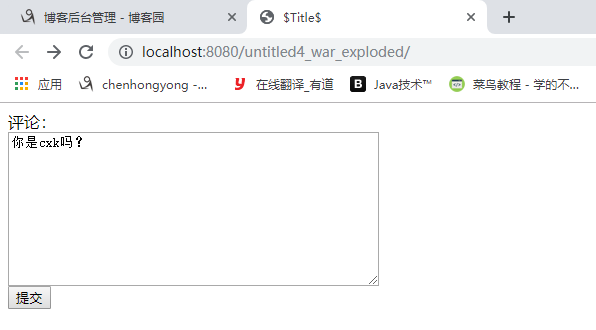JavaWeb 过滤敏感词汇
提交的表单数据,常常要检查有没有敏感词汇,如果有,需要给出提示,或者替换为*。
检查、替换敏感词汇有3种常用的方式
(1)在Servlet中操作。
(2)在Filter中先检查。如果要替换敏感词汇,request没有setParameter()方法重新设置请求参数,怎么向Servlet中传递替换后的请求参数?使用request.setAttribute()把这些修改后的请求参数放到request域中即可。
(3)在Filter中创建request的代理,增强getParameter()方法,然后传入代理: chain.doFilter(request的代理对象 resp); 。如何增强getParameter()方法?getParameter()不是要返回一个String吗,先调用原来的getParameter()获取值,检查值中是否有敏感词汇,有就替换掉敏感词汇,返回替换后的值,没有敏感词汇就返回原值。
(1)、(2)较简单,但很繁琐,(3)最常用。此处只演示(3)。
敏感词汇
敏感词汇很多,可以存储在数据库中,也可以存储在文本文件中。
此处我们在项目根目录下新建文件夹resource,标识为资源根目录。resource下新建 illegal_word.txt 存储敏感词汇,一行一个。
煞笔
制杖
cxk
每次都从数据库读或文件取读敏感词汇,会增加时间开销,可以把取敏感词汇放到ServletContext中,全局共享、随时可用。
怎么放?Filter的init()方法在Filter生命周期中只调用一次,可以在init()中读取敏感词汇,将敏感词汇放到ArrayList<String>中,再将这个list放到ServletContext中,这样避免了每访问一次就读取一次的问题。
表单
<form action="handlerServlet" method="post"> 评论:<textarea name="comment" rows="10" cols="50"></textarea> <button type="submit">提交</button> </form>
Filter
@WebFilter("/handlerServlet")
public class HandlerFilter implements Filter {
public void destroy() {
}
public void doFilter(ServletRequest req, ServletResponse resp, FilterChain chain) throws ServletException, IOException {
//解决中文乱码
req.setCharacterEncoding("utf-8");
resp.setContentType("text/html;charset=utf-8");
//jdk动态代理
ClassLoader classLoader = req.getClass().getClassLoader();
Class<?>[] interfaces = req.getClass().getInterfaces();
//创建InvocationHandler接口的实例。此处使用匿名内部类来创建
InvocationHandler invocationHandler = new InvocationHandler() {
@Override
public Object invoke(Object proxy, Method method, Object[] args) throws Throwable {
//只增强getParameter()
if(method.getName().equals("getParameter")){
//调用原有的getParameter()获取参数值
String text = (String) method.invoke(req, args);
//检查是否有敏感词汇
Object obj = req.getServletContext().getAttribute("illegal_word_list");
ArrayList<String> list=(ArrayList<String>)obj;
for (String word : list){
if (text.contains(word)){
//用一个*替换一个字符
String replac="";
for(int i=0;i<word.length();i++){
replac+="*";
}
//替换所有匹配
text = text.replaceAll(word, replac);
}
}
return text;
}
//如果调用的是getParameter(),执行到前面的return就结束了,不会执行到此
//如果调用的不是getParameter(),就调用原方法,不做修改
Object returnValue=method.invoke(req,args); //调用目标方法
return returnValue;
}
};
//创建req的代理对象
Object proxyInstance = Proxy.newProxyInstance(classLoader, interfaces, invocationHandler);
//强转为ServletRequest
ServletRequest reqProxyInstance = (ServletRequest) proxyInstance;
//传入req的代理对象
chain.doFilter(reqProxyInstance, resp);
}
public void init(FilterConfig config) throws ServletException {
InputStream is= this.getClass().getResourceAsStream("/illegal_word.txt");
//因为要readLine()一行一行地读,需要使用BufferedReader流,所以先转换为Reader,再加Buffer
InputStreamReader isr = new InputStreamReader(is);
BufferedReader br = new BufferedReader(isr);
ArrayList<String> list=new ArrayList<>();
String str=null;
while (true){
try {
str=br.readLine();
if (str!=null)
list.add(str);
else
break;
} catch (IOException e) {
e.printStackTrace();
}
}
//放到ServletContext中
config.getServletContext().setAttribute("illegal_word_list",list);
}
}
测试用的Servlet
@WebServlet("/handlerServlet")
public class HandlerServlet extends HttpServlet {
protected void doPost(HttpServletRequest request, HttpServletResponse response) throws ServletException, IOException {
String comment = request.getParameter("comment");
response.getWriter().write(comment);
}
protected void doGet(HttpServletRequest request, HttpServletResponse response) throws ServletException, IOException {
doPost(request,response);
}
}
效果

这种方式是增强getParameter(),通过getParameter()获取参数值时,都会先自动检测是否有敏感词汇。





 浙公网安备 33010602011771号
浙公网安备 33010602011771号